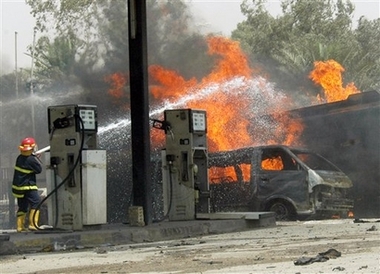Attacks across Iraq claim 142 lives
(AP)Updated: 2007-08-02 13:26
BAGHDAD - Baghdad shook with bombings and political upheaval Wednesday as the largest Sunni Arab bloc quit the government and a suicide attacker blew up his fuel tanker in one of several attacks that claimed 142 lives nationwide.
The US military announced the deaths of four more American soldiers, including three killed in Baghdad on Tuesday by a powerful armor-piercing bomb. Washington says these types of bombs are sent from Iran. The fourth soldier was killed by small arms fire on the same day. A British soldier also was killed Tuesday in a roadside bombing.
The American military announced it found a mass grave in Diyala province northeast of the capital. The grave contained 17 bodies of mostly Sunni Muslims - including women, children and elderly people - killed by al-Qaida in Iraq, the military said in a statement. US forces did not say how they knew the attackers were al-Qaida in Iraq.
Altogether at least 142 Iraqis were killed or found dead, including 70 in three separate bombings Wednesday in Baghdad. The violence came after July ended as the second-deadliest month for Iraqis so far this year, but with the lowest US death toll in eight months.
Washington has been pushing al-Maliki's government to pass key laws - among them, measures to share national oil revenues and incorporate some ousted Baathists into mainstream politics. But the Sunni ministers' resignation from the Cabinet - not the parliament - foreshadowed even greater difficulty in building consensus when lawmakers return after a monthlong summer recess.
President Bush prodded al-Maliki to unite rival factions and show some overdue political progress. the White House said.
The two leaders spoke for 45 minutes in a secure video conference, part of a regular series of conversations on the war and Iraq's struggling democracy.
"The president emphasized that the Iraqi people and the American people need to see action - not just words - but need to see action on the political front," White House press secretary Tony Snow said. "The prime minister agreed."
Rafaa al-Issawi, a leading member of the Front, said the decision to pull out of government was sealed by what he called al-Maliki's failure to respond to a set of demands put forward by the Accordance Front last week. At the time, the Sunni bloc gave the prime minister seven days to meet its demands - an ultimatum that expired Wednesday.
Among the demands: the release of security detainees not charged with specific crimes, the disbanding of militias and the participation of all groups represented in the government in dealing with security issues.
"The government is continuing with its arrogance, refusing to change its stand and has slammed shut the door to any meaningful reforms necessary for saving Iraq," al-Issawi said at a news conference in Baghdad.
"We had hoped that the government would respond to these demands or at least acknowledge the failure of its policies, which led Iraq to a level of misery it had not seen in modern history. But its stand did not surprise us at all," he said, reading from a prepared statement.
The Accordance Front has 44 of parliament's 275 seats, and those politicians will continue in the legislature. The withdrawal of its six Cabinet ministers from the 14-month-old government is the second such action by a faction of al-Maliki's coalition.
Five Cabinet ministers loyal to radical Shiite cleric Muqtada al-Sadr quit the government in April to protest al-Maliki's refusal to announce a timetable for the pullout of US forces from Iraq.
Al-Maliki's office expressed regret over Wednesday's withdrawal and said it was open to communicating with the Accordance Front and other parties. But it did not address the Front's grievances or al-Maliki's apparent refusal to consider them.
"Our goal has been always the continuation of the active political participation and that everybody shoulders his responsibility in running the country and making the decisions," the government said in a statement. "We will maintain contacts with all blocs, including the Accordance Front."
Earlier, the Front's leader, Adnan al-Dulaimi, said its members would remain in the legislature.
"Withdrawing from the government doesn't mean that we will abandon the whole political process. We will continue our participation ... through the parliament and we will contact other parliamentary blocs to achieve our demands," al-Dulaimi told The Associated Press.
Wednesday's deadliest attack occurred when a fuel tanker was exploded near a gas station in western Baghdad's primarily Sunni Mansour neighborhood. At least 50 people died and 60 were wounded, police said. Two police officers, both speaking on condition of anonymity out of security concerns, said the explosion was the work of a suicide attacker.
Earlier, a parked car bomb killed 17 civilians and left a gaping, one-yard-deep crater in a busy square in central Baghdad, police said. At least 32 people were wounded by the blast, which shattered windows at a popular ice cream parlor. Blood was pooled on the street.
Thamir Sami, 33, was carrying clothes from his menswear shop out to his car when the explosion shook the area.
"Women and children were lining up near the gas station to get fuel," he said. "I saw burnt bodies. Other motorists and I helped evacuate the wounded before the ambulances came."
|
|
|
||
|
||
|
|

